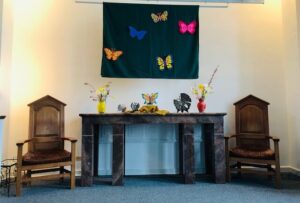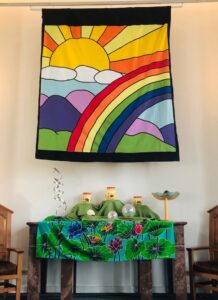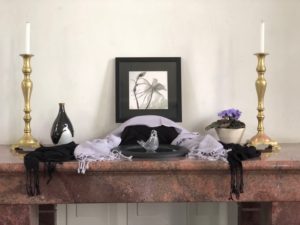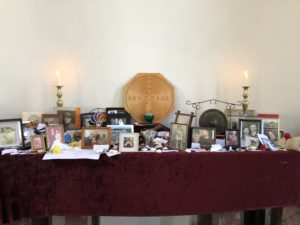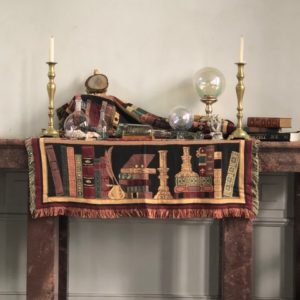Read the Order of Service.
As I said earlier, this month we’re looking at “risk,” which is something we have to deal with every day, whether we’re conscious of it or not. There are the big risks of course – telling someone you love them, or that you no longer do. Leaving the security of the job you have, to find a job that you’ll love. Going deep with someone, revealing who you really are. Committing to changing who you are because it’s not who you want to be. Giving up an advantage because you know it isn’t right. Showing up in solidarity with people who are marginalized, oppressed, vulnerable, even though that might put you at risk for the same.
Yet even if we aren’t doing any of these kinds of things, we’re dealing with risk all the time. If I walk down a set of stairs there’s the risk I could fall. If I drive down the street there’s the risk of being in an accident. If I decide to eat some pizza that was left out overnight, or drink some milk that’s a little past its “Use By” date …
Those who are newer to TJMC may not know that before I entered the ordained ministry I was a performer – a juggler, magician, clown, escape artist, fire eater … None of these is without a certain amount of risk; some of them are flat-out Risky with a capital “R.” And over the years – I started performing when I was about 11 – I’ve learned a lot more than just the skills I was practicing. I have come to see that the circus arts offer metaphors for ways we can live our lives more richly and fully. I believe that the things you can learn as a juggler-magician-clown-escape artist-fire eater are lessons that can apply to our lives.
How often have you felt as though you’re balancing on a tightrope, where a wrong step this way or a wrong step that way could spell disaster?
You might think that the logical thing to do, the safe thing to do, would be look down at your feet to make sure that you put each one in just the right place … but you’d be wrong. In fact, doing that actually makes it virtually impossible to maintain your balance. Instead, the tightrope walker lifts their gaze and focuses on the end of the rope. And perhaps counter intuitively, it’s that forward gaze that makes all the difference.
Now … I’m not a tightrope walker, but I am a juggler, and Cypress just read a great piece about some of the lessons you can learn from that art. I’ll add one more. A lot of us feel at times that we’ve got “too many balls in the air.” I can’t tell you how many check-ins, in how many committee meetings, at least one person has said something like this, or in how many personal conversations it comes up. But one of the things you learn when you’re juggling is that although it seems like there’s too much going on, the truth is that there’s always only one thing happening at a time. You’re catching a ball, or you’re throwing a ball. Catching a ball or throwing a ball. That’s it, and that’s true if you’re juggling three balls, or the world record of 11.
But I’ve been building up to something here. Of all of the odd skills I’ve picked up in my pursuit of sacred play, nothing is more risky than fire eating. First … well … there’s the fire. And then there’s the beard. And then there’s the fire again.
My teacher was a woman named Margie Brown – Rev. Margie Brown, actually, because she was an ordained United Methodist minister. She learned to eat fire from a man named Ken Feit – Father Ken Feit, to be precise, because he was a Catholic priest. Now … you might not think that fire eating is the kind of thing that clergy folk would do, but according to Maggie, Ken once made the insightful observation that every religious tradition we know anything about has used fire as a symbol of the sacred. And every religious tradition we know anything about has some form of communal experience of eating. So, Ken said, it’s only natural to bring the two together in religious fire eating. [He also said that the way to learn to eat fire is to sit for an hour in a darkened room, staring into the flame of a candle. Then … eat a habanero pepper, and you’re all set.]
Margie was a nationally known storyteller. But when a conference or other big event wanted to hire her for that, she had condition – they had to give her a place where she could teach fire eating. I can’t imagine how many people she taught over the years and, through her teaching and her presence, influenced. But talking about fire eating is like talking about a recipe. It’s good as far as it goes, but the thing itself is better. So …
Why was Margie so committed to teaching fire eating? Why do I love to do it so much? Well … for one thing … you gotta admit that it’s pretty cool. But there’s a lesson in it, too. A pretty important one.
At the end of her workshops Margie would tell her students that she didn’t really care if they ever ate fire again. What she wanted us to take away from the experience was the memory, the experience of having come face-to-face with something scary, something dangerous, and that rather than running from it we moved in closer. We didn’t push it away, we pulled it towards us. There was a risk in doing so, of course, but when we did – with full conviction and commitment – we saw that scary, dangerous thing transformed into something beautiful and awe inspiring.
I haven’t always had the courage to do it, to take that risk. But I’ve never forgotten the lesson, nor the ones I’ve learned from magicians, jugglers, tightrope walkers, elephant wranglers, ring masters, escape artists, clowns, and fire eaters.



